I have a networking layer that currently uses completion handlers to deliver a result on the operation is complete.
As I support a number of iOS versions, I instead extend the network layer within the app to provide support for Combine. I'd like to extend this to now also a support Async/Await but I am struggling to understand how I can achieve this in a way that allows me to cancel requests.
The basic implementation looks like;
protocol HTTPClientTask {
func cancel()
}
protocol HTTPClient {
typealias Result = Swift.Result<(data: Data, response: HTTPURLResponse), Error>
@discardableResult
func dispatch(_ request: URLRequest, completion: @escaping (Result) -> Void) -> HTTPClientTask
}
final class URLSessionHTTPClient: HTTPClient {
private let session: URLSession
init(session: URLSession) {
self.session = session
}
func dispatch(_ request: URLRequest, completion: @escaping (HTTPClient.Result) -> Void) -> HTTPClientTask {
let task = session.dataTask(with: request) { data, response, error in
completion(Result {
if let error = error {
throw error
} else if let data = data, let response = response as? HTTPURLResponse {
return (data, response)
} else {
throw UnexpectedValuesRepresentation()
}
})
}
task.resume()
return URLSessionTaskWrapper(wrapped: task)
}
}
private extension URLSessionHTTPClient {
struct UnexpectedValuesRepresentation: Error {}
struct URLSessionTaskWrapper: HTTPClientTask {
let wrapped: URLSessionTask
func cancel() {
wrapped.cancel()
}
}
}
It very simply provides an abstraction that allows me to inject a URLSession instance.
By returning HTTPClientTask I can call cancel from a client and end the request.
I extend this in a client app using Combine as follows;
extension HTTPClient {
typealias Publisher = AnyPublisher<(data: Data, response: HTTPURLResponse), Error>
func dispatchPublisher(for request: URLRequest) -> Publisher {
var task: HTTPClientTask?
return Deferred {
Future { completion in
task = self.dispatch(request, completion: completion)
}
}
.handleEvents(receiveCancel: { task?.cancel() })
.eraseToAnyPublisher()
}
}
As you can see I now have an interface that supports canceling tasks.
Using async/await however, I am unsure what this should look like, how I can provide a mechanism for canceling requests.
My current attempt is;
extension HTTPClient {
func dispatch(_ request: URLRequest) async -> HTTPClient.Result {
let task = Task { () -> (data: Data, response: HTTPURLResponse) in
return try await withCheckedThrowingContinuation { continuation in
self.dispatch(request) { result in
switch result {
case let .success(values): continuation.resume(returning: values)
case let .failure(error): continuation.resume(throwing: error)
}
}
}
}
do {
let output = try await task.value
return .success(output)
} catch {
return .failure(error)
}
}
}
However this simply provides the async implementation, I am unable to cancel this.
How should this be handled?

